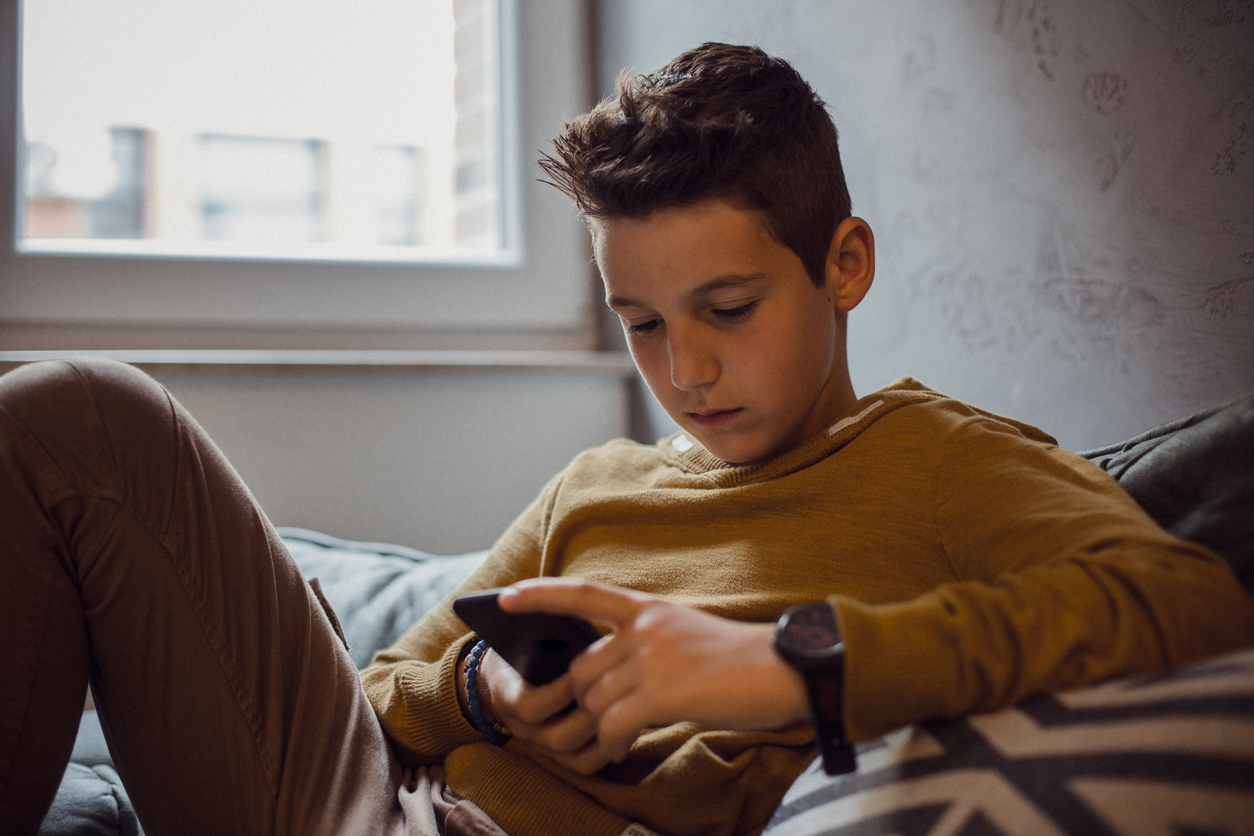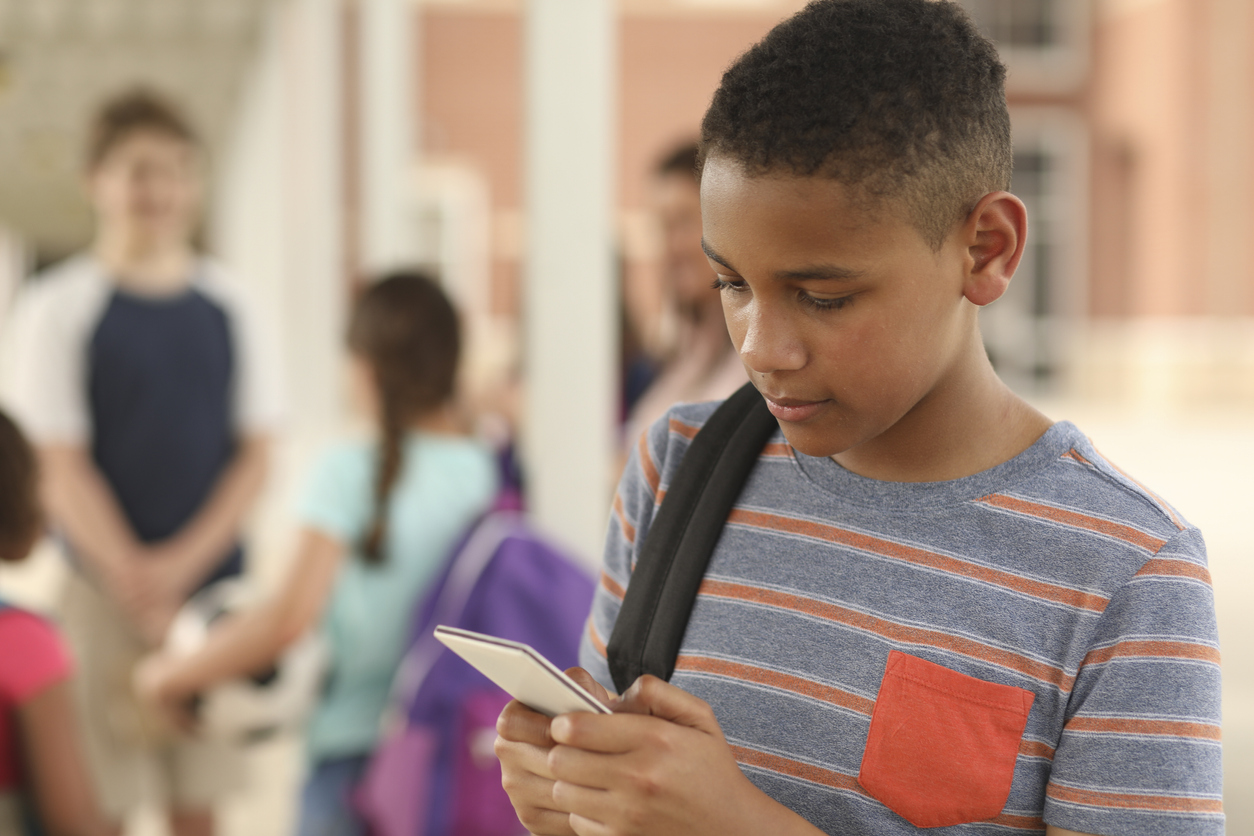
I have spent years and years of my child's life telling him he would never, ever get a phone, or that if he did, it would be years and years from now. Years! So many hours, you guys. I didn't get a cellphone until I was 21, and I was hoping we could hold off at last until our son was 15. But lo and behold: He is about to be 11, he has a cellphone, and we have recently spent a lot of time learning about tween phone safety.
First and foremost, when I say he has a phone, I should clarify that he has my old phone that barely works. Like many kids, he spent the better part of a year or two coming up with a long list of reasons why he needed a phone. Like many parents, we ignored him. But then he grew up a little bit and all of the sudden started spending time with friends without us … or without any parents, period.
Whaaaaaat? I was not prepared for my freshly 10-year-old child to feel confident enough to visit the library without someone he knew or to ask to be dropped off somewhere with just his friend. The latter is still a hard no (I don't care), but the former I had a hard time saying no to. It's the library!
So we added a line to our plan for $10, took the phone to the shop, and got the kid a SIM card. Of course, he didn't get to even touch it until he had completed our handy-dandy-totally-made-up plan for tween phone safety:
1. We made him learn internet safety.

One of the biggest reasons we didn't want our son to have a phone is because I don't think any tween is really capable of understanding the importance of internet safety. You know: why it matters, and how you actually keep yourself safe online.
I do feel like our son is lucky in one aspect. His dad and I have both been online for years and years, and I have been particularly active online since I was 12 (for reference, I'm 35 now). So we have seen the internet go through a lot of phases, and we've each learned internet safety the old-school way (trial and error).

The first thing we all did together was explore Google's "Be Internet Awesome" program. Our son homeschools, but friends have told me that a lot of kids cover this program in school. That's great, but I recommend looking at it with your kid, too, so you can see what they're talking about. It matters! Plus, you're never too old or too web-savvy to get a few reminders and tips.

Google has a game called Interland, and anyone can play it. The whole goal is to walk the user through internet safety through a variety of games and modules. Our son likes it so much he still plays it sometime!
We really focused on internet safety first and foremost because the whole reason he wanted a phone was to be able to access the internet. While talking to him about internet safety, we quickly realized how little information he really had. The idea of just giving our kid a device that can access the entire internet and hoping for the best was never going to fly for us.
Also, this program alone isn't enough. We regularly sit down with our son and look at what he's watching online with him — especially when he's watching videos on YouTube.
2. Watch what they watch, consume what they consume.

The biggest reason we watch what he watches is less because we're worried he'll watch unsafe content (I'll get to that, though) and more because he's still young, and I know full-grown adults who don't understand how to make sure the information they're receiving online is valid.
This is the process I told my son: When I read an article or watch a video and hear a fact or something that is presented as a fact, I make note of it. Sometimes I write it down, but most of the time I just pop it into a new tab. Then I look up the "fact" to discern if it's true and if it can be backed up by multiple reputable sources. If it can, only then am I comfortable knowing it's out there and it's in my head.

For me, sources include news organizations and professional and academic publications. I do not consider Wikipedia a reliable source that can verify facts. In fact, our kid recently came home talking about a video channel he watched at a friend's house. He had some interesting information, but it was littered with inaccuracies that mattered. We sat down and started going through each of those, one by one, and then realized we couldn't even find another site that said the YouTube channel in question was a legitimate source of information.
3. Guard their social media.

One of the reasons that our kid wanted a phone at first was to get on Instagram … which is hilarious because the only person he knows on Instagram is me. So I let him make an account that he used from my phone first, so I could see what he was hoping to get out of the app.
It turns out he mostly wanted to follow pet accounts, and he added a few museums and NASA accounts as well. He also used his Instagram for about three days before forgetting about it totally, and it's not even on the phone he has now.

Another way we have guarded his social media use is to let him use Messenger Kids. There's no reason for my almost 11-year-old to be on Facebook, and he doesn't want to be. But he loves being able to message his friends, and he especially loves sending stickers and GIFs. Which, same.
So I set him up with a Messenger Kids account, which I chose because it goes through my Facebook account — he can't just add whoever he wants, and people can't send him friend requests without me knowing about it. I'm hoping we can keep this arrangement until he's old enough to have his own Facebook page, and by then he might not even want one.
Funnily, after an initial burst of excitement about Messenger Kids, he now checks it maybe once a week, if that. Even funnier, the phone itself isn't charged half the time.
What have we learned about tween phone safety? I'm not sure.

Basically, what we learned is that with our specific child, getting the phone was like 75% of the appeal. I do like that he has it and can take it with him when he goes to friends' houses, and I recently went out of town and delighted in the fact he has taken to answering his phone with a simple "Sup?" when I call him. But other than that, the phone has not become the drag on his time and confidence that I worried it might be.
It's worth reiterating here that he's not in public school, and there's probably some disconnect between how he feels about his phone and how other kids feel about theirs. But also, all this exposure to technology and discussions about how the internet works seems to have kind of turned him off the whole thing. Right now, he insists on a being "off the grid" and doesn't want his name or photo shared online without his explicit permission, which we both support and agree with.

So it could be that getting him a phone and promptly insisting we have ongoing conversations in which he can learn about how to be safe online and all the highs and lows of online life has made the thing itself less appealing. Or it could be that he's one of those adorable weirdos who eschew tech. Either way, getting our kid a phone has been an interesting experience, and I'm sure it will continue to evolve as he moves through his teen years.







